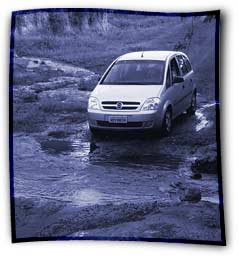
 he rich, red road rose up to meet us as we bounced along the Campo Grande countryside. It was late Sabbath morning on a bright Southern Hemisphere summer day, and my husband, daughter, and I were on our way to Jardim, Mato Grosso do Sul, Brazil.
he rich, red road rose up to meet us as we bounced along the Campo Grande countryside. It was late Sabbath morning on a bright Southern Hemisphere summer day, and my husband, daughter, and I were on our way to Jardim, Mato Grosso do Sul, Brazil.
I was traveling there via rental car to cover a story for the Adventist World magazine. I had gotten a tip before leaving the United States that an Adventist from Jardim had courageously conducted Bible studies ?in the woods.? Several baptisms resulted from his efforts.
The country of Brazil--both in landscape and people--is wonderfully diverse and beautiful. The roads are not. The paved highways are pitted with potholes and are marginally better than many of the other thoroughfares, which are composed of packed dirt, gravel, and rocks similar in look (and feel) to cobblestones. Add dust, heat, and speed limit-breaking Brazilian drivers to the mix and any trip longer than 20 minutes is bone-jarringly uncomfortable.
 Once in Jardim, Armando Elias guided us to the church where he had served as elder when he did several evangelistic campaigns. We met with other local church officials, had lunch, and then headed out to the rural communities where the Bible studies had been held.
Once in Jardim, Armando Elias guided us to the church where he had served as elder when he did several evangelistic campaigns. We met with other local church officials, had lunch, and then headed out to the rural communities where the Bible studies had been held.
As we moved into hour five of bumpy travel, I marveled at Armando?s dedication and perservance. Twenty-two times he packed a borrowed car, sans air-conditioning, a VCR, and a small television, and trekked from the comfort of his home across rutted roads and dangerous countryside to a location that was truly in the wilderness in order to share Jesus with farm folk.
We met a few of Armando?s converts (spending more hours rattling about in the car as we traveled from ranch to ranch), and I was impressed further. No visit was cut short, regardless of time or agenda (or darkness, for that matter). I was surprised, at first, to see the high esteem and genuine love evangelist and convert had for each other--and it startled me to see the maturity of faith in these newly baptized members. But as we traveled back along our treacherous path after midnight, keeping a watch for kidnappers and thieves, I realized that Armando wasn?t strange. He was living boldly for Jesus, relying on Christ--and His rod and staff--as his comfort (Ps. 23:4).
It dawned on me: this is how evangelism is done. Personally. Intentionally. Thoroughly. And naturally.
If Armando can reap such results with such means as a TV, VCR, videotaped Bible studies, and electricity from a generator, what is my excuse? I don?t need the comfort of a hotel conference room or the plush interior of the church to make a difference. What is to stop me from talking and sharing anyplace with even just one person? What am I waiting for: the ?church? to organize an event? The pastor to decide that my neighborhood needs evangelizing? I?ve shared recipes, housework, soccer games, work frustrations, and a host of other items from daily life with people, but have I shared the joy I have in Jesus? Not often enough.
Being a disciple of Christ is learning how to balance duties and responsibilities with outreach and witnessing. And it means not being afraid to get out of my comfort zone and share what Jesus and faith mean. For Armando, doing evangelism is as natural as breathing.
?Instead of looking forward to some future time when, through a special endowment of spiritual power, they will receive a miraculous fitting up for soul winning, [persons] are yielding themselves daily to God, that He may make them vessels meet for His use. Daily they are improving the opportunities for service that lie within their reach. Daily they are witnessing for the Master wherever they may be, whether in some humble sphere of labor in the home, or in a public field of usefulness? (Ellen White, The Acts of the Apostles, p. 55).
We don?t have to be comfortable to do evangelism. It is great to have nice settings, organized materials, and seasoned speakers; it is not, however, always necessary. The hall doesn?t have to be just right, the flyers don?t have to be perfect, and the speaker doesn?t have to be someone with years of training and experience.
You and I have a responsibility to witness to others, and it should be as natural and predictable as breathing.
Kimberly Luste-Maran is an assistant editor of the Adventist Review.